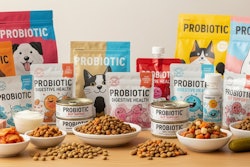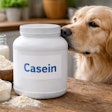
As pet food formulators increasingly focus on how pets’ gut health influences overall health, probiotics and nutraceuticals have appeared in pet food and treat recipes as means of nurturing the gut microbiome. A literature review examined empirical evidence related to the interactions of probiotics and nutraceuticals with dogs’ and cats’ gut microbiomes.
“We investigated the effects of probiotics and natural antioxidant molecules on digestion, immunological response, and barrier integrity in gastrointestinal health studies concerning dogs and cats,” the researchers wrote in the journal Pets. “The analysis indicated that probiotics influence gut microbiota composition in a positive manner, enhance digestion, augment the immune response, and help to maintain barrier integrity. Additionally, natural products with antioxidant molecules showed the potential to improve gut health and protect pets from various illnesses.”
Pet food has gone beyond meeting pets' nutritional needs to feeding the communities of microbes that live in the animals’ digestive tracts, called the gut microbiome. A wide array of bacteria and other microscopic lifeforms dwell in the crevices of dogs’ and cats’ intestines, forming complex communities. When it’s working well, the pet microbiome helps with digestion and influences a wide array of seemingly unrelated aspects of pet health. This microbiome may help synthesize essential nutrients and reinforce the gut’s physical barrier. When the microbiome isn’t functioning well, dogs and cats may suffer inflammatory bowel diseases, inefficient digestion or other problems.
Gut microbiome and probiotics’ effects on health
In the literature review, the authors compiled research results suggesting that gut microbes assist with immune function and produce short-chain fatty acids (SCFAs), such as butyrate, acetate, and propionate. These SCFAs maintain gut health by providing energy to intestinal cells, reducing inflammation, and aiding in digestion.
However, disruptions in this microbiome can lead to health issues, such as chronic enteropathies, including inflammatory bowel disease and acute diarrhea. Probiotics may prevent harmful microbial overgrowth, reduce inflammation and support nutrient absorption. Probiotics may even serve as alternatives to antibiotics, which can disturb gut flora and promote antimicrobial resistance.
Commonly used probiotics in pet products include strains of Lactobacillus and Bifidobacterium, which contribute to maintaining a balanced microbiome. Research provides evidence that probiotics support epithelial barrier function by promoting mucin production, strengthen immune responses and reduce inflammation in the gut.
For example, studies on specific canine probiotics, such as Lactobacillus fermentum and Enterococcus faecium, have shown increased beneficial bacteria levels and decreased pathogenic bacteria in the digestive tract. In cats, probiotic strains like Lactobacillus acidophilus have been found to enhance gut health by lowering fecal pH and reducing the presence of harmful endotoxins. The benefits of probiotics vary depending on the strains used and the individual animal's microbiome.
Nutraceuticals and antioxidants influence on pet microbiomes
In addition to probiotics, nutraceuticals, including natural antioxidants, are gaining traction in pet care. Derived from plant-based sources, these compounds offer benefits beyond basic nutrition. Antioxidants, for instance, neutralize free radicals that can damage cells and contribute to chronic illnesses. Curcumin, or turmeric, is noted for its anti-inflammatory properties and may benefit pets with gut inflammation.
Another promising nutraceutical is derived from Boswellia serrata, a type of frankincense that contains anti-inflammatory compounds. Studies indicate that it can alleviate symptoms of chronic enteropathies by reducing inflammation. Zinc, beta-carotene, and vitamins A, E, and D are additional nutraceuticals supporting gut and immune health by reducing oxidative stress and inflammation.
“Although this field of study is still in its early years, there is mounting evidence that certain therapies have major advantages,” the literature review authors wrote. “Ultimately, more targeted and efficient methods for supporting digestive health in pets will be possible with a greater comprehension of the intricate relationships that exist between the gut microbiome, nutrition, and immune system function.”

















